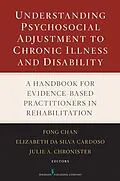Rehabilitation practitioners face the difficult task of helping clients adjust to chronic illness or disability. This can be a long and trying process for both practitioner and client. With this handbook, however, practitioners and students can gain a wealth of insight into the critical issues clients face daily.
This book presents the dominant theories, models, and evidence-based techniques necessary to help the psychosocial adjustment of chronically ill or disabled persons. Each chapter is written from an evidence-based practice (EBP) perspective, and explores how important issues (i.e., social stigma, social support, sexuality, family, depression, and substance abuse) affect persons adjusting to chronic illness and disability.
Key features include:
- A review of psychopharmacological treatment options for depression, anxiety, and other disorders coinciding with rehabilitation
- The effect of rehabilitation on the family, including key family intervention strategies
- Strategies for using positive psychology and motivational interviewing in rehabilitation
- Multiculturalism and the effect of culture on the adjustment process
- Ancillary materials including an instructor's manual with a syllabus, examination items, PowerPoint presentation, and answers to class exercises
By incorporating research-based knowledge into clinical rehabilitation practice, health care professionals can ensure that people with chronic illness and disability receive only the best treatment.
Autorentext
Fong Chan, Ph.D. (University of Wisconsin-Madison) is the Norman L. and Barbara M. Berven Professor of Rehabilitation Psychology (Emeritus) in the Department of Rehabilitation Psychology and Special Education, University of Wisconsin-Madison. He has more than 37 years of experience conducting applied rehabilitation research in the topical areas of psychosocial interventions, demand-side employment, transition and postsecondary education, evidence-based vocational rehabilitation practices, multicultural issues in rehabilitation, and research methodologies. Dr. Chan has published over 400 refereed journal articles and 67 book chapters (h-index = 57). He is a fellow of the American Psychological Association and a National Institute for Disability, Independent Living, and Rehabilitation Research (NIDILRR) Mary Switzer research fellow. For his research, Dr. Chan has received 12 American Rehabilitation Counseling Association Research (ARCA) Awards, the National Council on Rehabilitation Education (NCRE) Career in Rehabilitation Education Award, the ARCA James Garrett Distinguished Career in Rehabilitation Research Award, and the American Psychological Association, Division of Rehabilitation Psychology, Tamara Dembo and Beatrice Wright Lecture Award. Dr. Chan is the co-editor of the Rehabilitation Counseling Bulletin, an associate editor for the Australian Journal of Rehabilitation Counseling, and editor of six rehabilitation counseling textbooks.
Inhalt
"Section I: Introduction
Chapter 1 An Introduction to Evidence-Based Practice Approach to Psychosocial Interventions for People with Chronic Illness and Disability
Section II: Psychosocial Adjustment to Chronic Illness and Disability: Concepts, Models, and Research
Chapter 2 The World Health Organization ICF Model as a Conceptual Framework of Disability
Chapter 3 Psychosocial Adaptation to Chronic Illness and Disability: Models and Measurement
Chapter 4 Models, Research, and Treatment of Coexisting Depression for People with Chronic Illness and Disability
Section III: Relevant Mediators and Moderators of Psychosocial Adjustment to Chronic Illness and Disability
Chapter 5 Coping and Rehabilitation: Theory, Research, and Measurement
Chapter 6 Social Support and Rehabilitation: Theory, Research and Measurement
Chapter 7 Family and Adaptation to Chronic Illness and Disability
Section IV: Intervention Strategies Chapter 8 Positive Psychology and Psychosocial Adjustment to Chronic Illness and Disability
Chapter 9 Application of Self-Efficacy Related Theories in Psychosocial Interventions
Chapter 10 Wellness and Promotion of Health in Chronic Illness and Disability: Theoretical and Practical Models for Assessment and Intervention
Chapter 11 Psychopharmacology: A Review of Current Treatment Options
Section V: Societal Attitudes toward Disability Chapter 12 Societal Attitudes toward Disability: Concepts, Measurements, and Interventions
Section VI: Special Issues Chapter
13 Psychiatric Rehabilitation
Chapter 14 Substance Abuse: Models, Assessment, and Interventions
Chapter 15 Sexuality and Disability
Chapter 16 Multiculturalism and Adjustment to Disability
Section VII: Outcome Measurements
Chapter 17 Quality of Life and Psychosocial Adaptation to Chronic Illness and Disability
"
